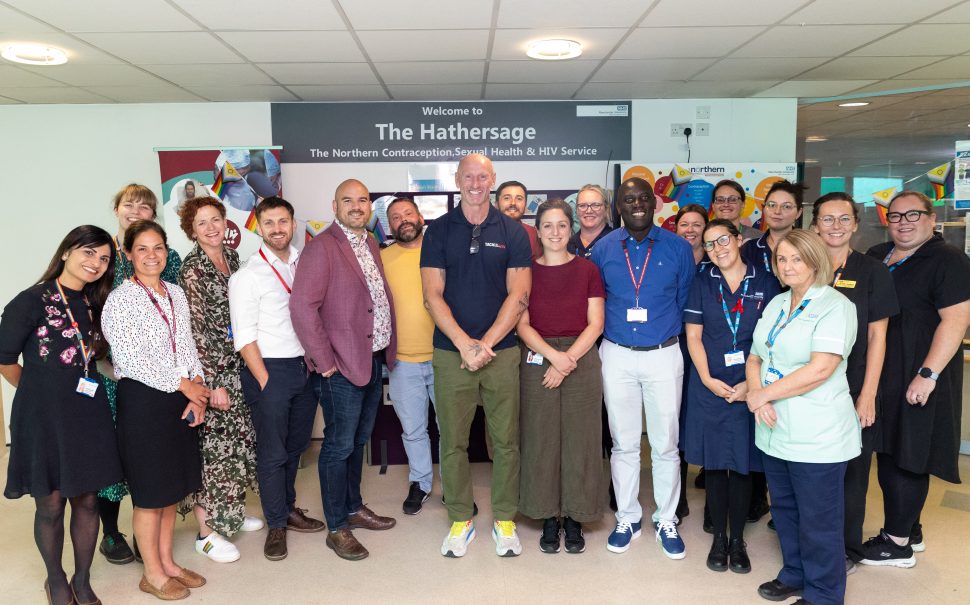Gareth Thomas’s Tackle HIV Bus Tour got off to a flyer after taking to the University of Manchester to remove the stigma surrounding sexual health.
Tackle HIV is a public awareness and education initiative led by Welsh rugby icon Thomas in partnership with ViiV Healthcare and Terrence Higgins Trust, inspired by his own experience living with HIV and the public misconceptions surrounding the virus.
Embarking on a journey up and down to the country in the hope of altering public perceptions of HIV, Manchester acts as the first of a three-stop tour of universities, with the Tackle HIV team bringing their bus to Cardiff next week before finishing in Durham.
And given that young people are statistically the most likely to be diagnosed with a sexually transmitted infection, the 50-year-old is determined to empower change through his ‘myth-busting’ bus tour.
“It’s really important that we constantly keep giving people the relevant information because stigma is created through the lack of knowledge or the lack of proper information that people have,” Thomas said.
“It’s important that we understand that science and medicine has come so far. There is no need for it to be a stigmatised condition, yet if people don’t know how far science and medicine have come, then they’ll still think that it’s a virus that you can transmit through sharing a knife and fork, or sitting on the same toilet seat, or giving somebody a kiss.
“It’s only when you tell people and when people have the information that our stigma is smashed and broken down.
“It’s really important that we constantly keep delivering this message because the more we deliver the message, then the more people will listen, the more people will hear, the more stigma gets broken down.
“A lot of people look at HIV as a subject that we shouldn’t talk about, when it’s really a subject that a lot of us, with the right information, are able to celebrate.”
In the name of breaking down stigma surrounding HIV, the Tackle HIV team will also complete the Pen y Fan challenge , with Thomas climbing the highest peak in South Wales ten times in the space of 24 hours – a feat equivalent to scaling Mount Everest.
ViiV Healthcare Head of Government Affairs and Global Public Health Helen McDowell has delved further into why Tackle HIV has chosen to visit universities, hailing the younger generation as a ‘powerful agent of change’.
“Young people are an open generation who actually don’t have much knowledge about HIV in the UK, largely because it’s out of the media and the press,” McDowell said.
“A lot of young people actually don’t appreciate that HIV still is a public health risk and issue in the UK, so the intent of the campaign is to try and have those conversations with students to help them understand and learn a bit more about HIV and its risks in a safe space.
“Young people are such a powerful agent of change. They have the energy, the desire and the passion to talk about things that matter to them and I think it’s really important on so many different topics.
“They are the future of our country and therefore the ability for them to have an open mind and to not stigmatise people, whether it’s about HIV, religion, race or gender is such an important thing to have, because that will influence the next generation and the next generation as well.”
Tackle HIV also stresses the importance of testing as the UK strives to become the first country in the world to stop any new cases of HIV transmission by 2030.
Part of the tour’s Manchester leg involved visiting local hospitals where the ‘opt out’ scheme – which tests for HIV as part of a routine blood test – now operates in four of the city’s medical centres.
Terrence Higgins Trust chief executive Richard Angell says increased testing will be critical to the UK achieving its 2030 goal, with the ‘opt out’ scheme already producing stellar results.
“Thanks to Terrence Higgins Trust and our partners at National AIDS Trust and the Elton John AIDS Foundation, we convinced the government to spend money in A&Es across the country,” he said.
“Places like Manchester, Brighton, Blackpool, London, Salford and others now are automatically testing people for HIV who come into A&E and are having a blood test.
“In 18 months we found over 1,000 people who had HIV and didn’t know about it. Those people are now linked to care, getting the best treatment and many of them will now be undetectable which means they can’t pass on the virus when they’re having sex or having a baby.
“That’s an amazing thing and so the programme has been really, really successful. It means we could be the first country in the world to end new cases of HIV and that’s a pretty exciting thing to do and we’re aiming to do it by 2030.”
Tackle HIV is a campaign led by Gareth Thomas in partnership with ViiV Healthcare and Terrence Higgins Trust and aims to tackle the stigma and misunderstanding around HIV. For more information visit tacklehiv.org and follow @tacklehiv




